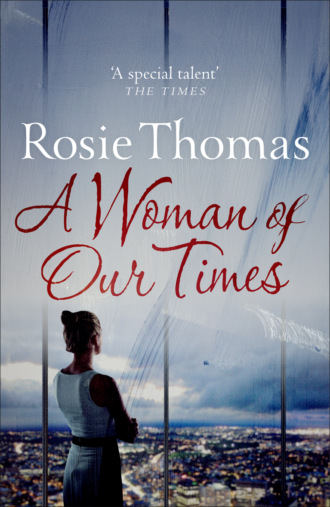
Полная версия
A Woman of Our Times
‘Of course not.’
Lisa snapped the cap back on to her lipstick, rolled her lips inwards over her teeth and then pressed them forwards into a pout. ‘I can’t say I blame you. But it’s a big decision, isn’t it? Couldn’t you try to forgive and forget? Leo’s not bad, even though he’s usually the first to tell you so.’
Harriet accepted that for Lisa this was an unusually profound speech.
‘I don’t love him.’
Lisa shrugged. ‘Then that simplifies it. Are you afraid of being on your own?’
Harriet thought of her married home, with all its symbols and reminders, stuffed with domestic comforts, the possessions of strangers.
‘It would be a relief.’
Downstairs the doorbell delivered its double chime. Lisa sprang to her feet, no longer listening. ‘Have a good time,’ Harriet called after her, feeling her age.
Kath and Ken were watching television downstairs. Harriet read a book, an Agatha Christie belonging to Kath, and went to bed very early. She lay in the dark in her old bedroom. She could hear the drone of the television below her. It reminded her of being a little girl, despatched to bed so that adult life could go on in her absence. From those long wakeful evenings she knew the contours of this room and its predecessors, the patches on the ceiling and the exact, unseen position of the picture rail and wardrobe and armchair. The creak of furniture and the hissing of pipes behind the skirting boards was like a language spoken after a long silence.
The familiarity of the room, the very smell of it, should have been oppressive, but after she had been lying there for a few minutes Harriet began to experience a strange sensation. She felt light, lighter than air. She felt as if she might bob up off the mattress, if it were not for the weight of the covers over her. It was as if she had had a great deal to drink, but without the dizziness or the confusion of drunkenness. Her mind felt very clear, and she knew that sleep was a long way off.
It occurred to her after a little while that what she did feel was free. She was on her own again.
It was exhilarating and also frightening. With her fists clenched on the bedclothes, as an anchor, Harriet reflected on what she might do. Her responsibilities to Leo, to marriage itself, seemed leaden in retrospect. The future possibilities, by contrast, shimmered around her. They were limitless, and there for the taking. She was afraid, but her fear was of failing to recognise the opportunities when they came. The thought of missing more of her chances than had already slipped past her, while her horizons were obscured by Leo, made her heart thump and panicky gasps rise in her chest. She made herself breathe slowly, in and out, to calm herself again.
The visions of freedom that came to Harriet, lying in the darkness of her old bedroom in Sunderland Avenue, were all of what she might achieve. She was briefly, thrillingly convinced that she could direct herself whichever way she wanted to go. She could reach out and pick off success for herself, as if it grew on the tree of heaven outside her window. She felt the power of it in her fingers.
The images of success and fame and happiness drifted in front of her. None of the visions had anything to do with love. She had had Love, and it had turned out to be Leo.
Everything that Harriet saw for herself was clear and vivid, but it was like a hallucination. When she tried afterwards to recapture the splendour of it all, or even to remember the simple steps that had carried her to such glory, she could come up with nothing at all. It had gone as conclusively as a dream.
She didn’t know how long the sensation lasted. After a while she felt her limbs growing heavy once more. She closed her eyes and was immediately too tired to open them again. A moment before she had felt that sleep was impossible, now it was catching up with her. She made no effort to resist it. Harriet gave a deep sigh of contentment and fell into a dreamless sleep.
Harriet and Kath were talking. At Harriet’s suggestion, because the pine bastion of the kitchen oppressed her, they went out into the garden and sat on folding chairs in the shade of the tree of heaven. It was a warm day for late September and the garden was suffused with yellow light. The buzz of Sunday afternoon lawnmowers drifted over the fence.
Harriet saw the neat suburban tableau with extra clarity, as if layers of dust had been washed out of the air by a thunderstorm. The memory of her waking dream had stayed with her, through a night’s sleep, through a family Sunday morning spent with Kath and Ken and Lisa. She knew that the dream had been profoundly significant, although she had no specific recall of the alluring images that had danced before her in the darkness.
She moved carefully with her sharpened awareness, as if there was a physically tender spot inside her that must be protected. As she looked at familiar things her clear sight seemed to give different, surprising perspectives.
Kath was wearing summer sandals on high cork heels, her toenails were painted with a dark, jammy red varnish.
Looking at her mother’s feet Harriet said musingly, ‘You used to have a pair of sandals like that when I was small.’
She remembered a blue skirt, too, and a small sandpit, perhaps in a playground. Kath in her blue skirt bent down to her with a cigarette curling blue smoke between her fingers.
‘Cork wedgies, that’s right. What a memory you’ve got,’ Kath said. ‘You can’t have been more than four or five.’
‘I can remember all kinds of things,’ Harriet answered. There was something else about today that reminded her of long ago. Perhaps it was the light, oblique and golden, the standard illumination of memory.
Kath looked at her with curiosity. ‘Can you? What things?’
‘Places where we lived, before Ken came. The one up a lot of stairs, where you could look down on the railway lines.’
‘That was a horrible place. I wish you’d forget it, I certainly have.’ Kath’s voice was sharp. They rarely talked about the time before Ken, before the advent of comfort and respectability.
‘It was all right, wasn’t it? I remember playing on the stairs. There was a fat woman who used to take me into her room and let me touch some china animals. Where were you?’
‘Working. Sybil used to mind you while I was out.’
‘Those days can’t have been easy for you.’ Harriet often wondered how she had managed, Kath who liked things nice and who hated rows or scenes, or even passion, any demonstration of naked feeling. Yet she had supported herself and an illegitimate daughter, in a series of menial jobs, until Ken Trott had come along to rescue them both. Except that Harriet hadn’t wanted to be rescued.
‘I had you, love. I wanted to look after you. I wasn’t going to let anything come between us, whatever else I had to do.’
Except Ken and Lisa, Harriet thought, and then almost laughed aloud at the tired old resentment that still came creeping up to assault her. Harriet was eight years old when Ken took Kath and her daughter into the first house and embarked on the processes of refurbishment, bathroom after bathroom and kitchen after kitchen, that had reached their high point here in Sunderland Avenue. Lisa was born when Harriet was ten. Adult Harriet knew that she had hated them both, stepfather and half-sister, until late into her teens. Young Harriet did not know what the feeling was, only that it cut her off. She dealt with it, and with other emotions that did not seem to fit in with being a Trott, by suppressing them. She played up the aspects of herself that were approved of, or at the least tolerated, and so she became Harriet the clever one, the determined one, the self-reliant one. Harriet with the wild temper, if you provoked her. Lisa was the pretty one, the one who was the image of her mother, the good little girl. The very memory made Harriet want to grind her teeth. She knew that she must have been a difficult child.
‘Poor you,’ she commiserated with her mother.
Kath was shocked. ‘I don’t know why you should say that. I’ve been very lucky. I could have ended up anywhere, considering the way I began.’
Harriet knew that the euphemism meant considering I was pregnant at eighteen, not married. She understood her mother’s fear of it, even now. It was serious, getting into trouble in the English provinces in 1952. Kath hardly ever talked about it.
Suddenly, in the sunny garden, Harriet’s consciousness of her dream suffered a dizzying change of focus. From feeling light and free, she felt sickeningly cut adrift. Her marriage was over. She was grown up, twenty-nine years old, without dependants, without a centre to her life. Kath had her centre, here with Ken, and Harriet felt ashamed of her adolescent, submerged resentment of it. For herself she had a job, perhaps a dozen real friends. It seemed little to show for thirty years of existence. Thinking of her mother’s much more frightening isolation at eighteen, Harriet was possessed by a longing to link herself with that vanished girl.
‘Tell me about it. You never have, not really.’
‘It’s all too long ago, love. Ken’s your Dad, isn’t he?’
‘Please.’ Harriet hadn’t speculated for years about the existence, somewhere, of a real father. Even in her most intensely separate years she had barely imagined him, and she was not asking about him now. It was Kath she wanted to hear about. She was afraid for herself and drifting. Kath’s story would expose the roots that went back before Ken’s time. The roots were buried deep; she could hold on by them.
‘Tell me,’ she begged. ‘Tell me about what you were like then.’
Kath was touched by her eagerness. She sat for a few seconds looking down the garden to the open patio doors that led into the quiet house, seeing beyond them. Then, surprising Harriet, she tapped her hands on the metal arms of her chair and began to laugh.
‘I was a bright spark in those days. I thought everything I wanted was just there for the taking.’
‘How strange,’ Harriet said softly. ‘I thought that too, last night. I had a peculiar dream about it, except that I wasn’t asleep.’ She wondered if their visions of everything were the same, linking them across thirty years. Kath was busy with her own memories, not listening.
‘I was very pretty, and I knew it.’ She turned to Harriet and pushed out her soft lower lip in a flirtatious pout that her daughter had never seen before. They both laughed.
‘I had plenty of boyfriends. There’d be the cinema on Friday nights, dancing on Saturdays. One or two of them even had cars. On Sundays we’d go for a drive, right out into the country, to a pub.’
‘What were they like, the boyfriends?’
‘I can’t remember. Brylcreemed hair, they all had. Jackets and ties.’
One of them, Harriet thought, had been her father. Which of them didn’t have any significance at all. She tried to imagine him, with his Brylcreemed hair, undoing the knot of his tie before unbuttoning Kath’s cotton shirtwaister. The picture would only come to her in black and white, like a still from a Fifties movie. She wondered if she had been conceived after the cinema, the dance or the country pub. There seemed no point in asking, ‘What was he like?’
‘I do remember someone from those days. Very vividly. I still think of him, sometimes.’
Harriet lifted her head. ‘Who is he?’
‘Oh, he was much older than me. He was the neighbour of your grandparents. We lived on one corner of the street and he lived on the opposite corner. Only his house was different, it was turned sideways so it looked in a different direction, and you couldn’t see into it from where we were, across the road. He kept to himself, and we hardly ever saw him. It was funny, the way we got to be friends.’
‘What happened?’
But Kath was simply absorbed in the recollection. She went on, when she was ready, without needing Harriet’s prompting.
‘I used to ride an old bike. I was doing a typing job for a shoe company and I’d cycle to work when the weather was good to save the bus fare. The day I properly met Mr Archer I think I must have been talking to a boy around the corner, where your gran couldn’t see me. After I said goodbye to him I got on the bike and swung round the corner on it, on the pavement. I ran straight into a lamp-post. Blinded by love, I suppose.’
Kath produced the pout again and Harriet laughed once more, although she was impatient for the story to continue.
‘I fell off, with the bike on top of me and the bike playing a tune because the wheel was buckled and some spokes had come loose. Mr Archer was coming up the road the other way, and he helped me up. I was half in tears, with the shock and with feeling a fool, and seeing my bike all bent.’
It came back to Kath as if it had happened a week ago. More than thirty years, she told herself, unwilling to believe it. Simon Archer had lifted the bike off her and held out his hand. She had taken it, and with her other hand she had pulled her skirt down to cover her knees. She had struggled to her feet, with his arm round her waist to support her, and the tinny tune wound down as the bicycle wheel stopped spinning.
‘The bike will mend,’ he said. ‘What about you?’
Kath had never said more than a good-morning to him before. She noticed that he spoke in a smart voice, like an announcer on the radio. She looked up at him and smiled, although her shin was smarting under a fierce graze and her hip and thigh throbbed from where she had hit the pavement.
‘I’m all right.’
‘Shall I fetch your mother?’
Kath made an imploring face. ‘No, please, unless you want to see me get a telling-off.’
‘You’d better come in with me, then. That leg needs a dressing.’
He wheeled her crippled bicycle into his garden and propped it behind the tall hedge. Kath had hobbled after him, up the path to the front door.
Inside, the house was bare and not very comfortable, but quite clean. Her rescuer made her sit on a wooden chair in the cream-painted kitchen, with her leg up on a low stool.
‘Dear me,’ he murmured. ‘Now then, first aid kit.’
Kath looked around, trying to focus on something other than the stinging cut. There was an old stone sink in the corner with a single dripping tap, a blue-and-grey enamelled oven on bowlegs, an old-fashioned wooden dresser with a few plain plates and cups, and a table in the middle of the room covered with an oilcloth.
It was shabbier than the kitchen at home and different from it not so much in its furnishing as in its feeling. Her mother’s kitchen was warm, busy, and scented with cooking. This room was cold, and Kath guessed there wouldn’t be much food stored behind the zinc grille of the meatsafe. She wondered about Mr Archer as she watched him filling a small metal bowl with hot water from his kettle. She knew that he was a widower, because she had heard her mother mention it, and she also knew that he did small electrical and mechanical repair jobs for people. That was all. She couldn’t even remember when he had come to live in the corner house, although he hadn’t been there for ever, the way her own parents had.
When he carried the bowl over and knelt down in front of her, she studied him carefully. She guessed that he was almost, but not quite, as old as her father. He had fair, rather thin hair, with a high parting, and a tall forehead. He was rather handsome, she thought, in a Prince Philip way, except that his face was lined and greyish. He glanced up at her and she saw that he had pale blue eyes.
‘You’d better take your stocking off, before I bathe your leg. I’m afraid it’s ruined, isn’t it?’
‘I can’t mend a huge hole like that.’ As if he was a doctor, Kath drew up her skirt and unhooked her suspenders. There was a tiny bulge of white flesh above the brown mesh stocking top, and she knew that they both saw it. She rolled the stocking deftly down until she reached the graze, and then she winced. ‘It hurts.’
‘Here.’ He slipped his thumbs inside the nylon tube and eased the torn edges away from the oozing graze, then twitched the stocking over her toes. ‘Done.’
Kath noticed that he had small, precise hands. He washed the wound, dabbing away the fragments of grit, and then lifted a piece of antiseptic gauze from its tin of thick, yellow grease and laid it in place. He finished off the job with a roll of bandage and then sat back on his heels to admire his handiwork.
‘Thank you,’ Kath said. ‘That feels much better.’ She wondered if they ought to shake hands, now that the emergency was past and they were looking at each other in an ordinary, social way. But he had taken off her stocking: it had created an intimacy between them that couldn’t be handshaken off.
‘I don’t know your name,’ he said, as if he had been thinking the same things.
‘It’s Kath. Katharine, really.’
‘Katharine’s pretty.’
‘I’m always called Kath,’ she said firmly, shaking her head to flick the hair back from her face. It had come loose in the fall.
‘Simon,’ he said. ‘Would you like a cup of tea, Kath?’
She still felt shaken, and it was comfortable, sitting with her leg up on the stool.
‘Yes, please, I would.’
While he boiled the kettle and set out two cups and saucers, Simon talked to her. She liked the sound of his voice.
‘Are you still at school? I haven’t seen you in your uniform lately, so I suppose not.’
So Mr Archer watched her coming and going. Kath was surprised to find that she was pleased with the idea. She pretended to be offended by the question, but went on smiling at him.
‘I’m seventeen. I work in an office, typing invoices, mostly. Not very interesting.’
‘And what else do you do?’
‘As much as I can.’
That was how they talked. Kath would tell him about herself and laugh, and he would ask more questions. He was friendly, but there was a hesitancy about him, as if he didn’t enjoy many conversations.
That first time, she remembered, he had told her that he would repair her bicycle. She had promised to come back a few days later.
When it was time to go she glanced down at her legs, and saw one glossy and smooth and the other bare and bandaged.
‘Better take the other one off too,’ she had said. She had peeled off the other stocking and then dropped the two of them, one perfect and one shredded, into her pocket. Simon made no attempt to look away, nor did she try to be coy. He didn’t leer, as most men she knew would have done. He simply watched her, with an openness that she found flattering.
‘I’ll be back, then,’ she had said.
‘That’s good.’ He had held the door open for her to walk through.
They had become friends. He mended the bicycle and came out to see her ride away on it. She called on him again and sewed the hem of a pair of curtains in his living room, where before they had hung down in neglected loops. After the third time she visited him without pretext. It was understood between them that she came when she felt like it and that it wasn’t necessary for him to visit her at her own house in return.
Kath’s mother referred to him as ‘Kath’s friend’, with a touch of pride. Mr Archer was gentlemanly, he had been an officer in the war, and had lost his wife tragically young. She didn’t, as she often protested, have any idea why he put up with listening to Kath’s nonsense. But he seemed to enjoy it, and it would do Kath no harm to talk to someone with a bit more sense than the boys she was endlessly running off to the pictures with.
That was how it was. Kath’s friendship with Simon Archer lasted for less than a year. Towards the end of that time Kath’s full skirts were no longer concealing the bulge underneath them, and her pretty face had taken on a pinched, defiant look.
Kath stopped talking. Busy with the threads of recollection, she didn’t see that Harriet was sitting stiffly upright in her chair. Kath was remembering one winter afternoon, early on, when she had knocked on Simon’s door after walking back from shopping. She had been wearing a scarlet wool scarf, and a matching knitted hat. She had followed him into the kitchen, laughing about something, and had dropped her hat and gloves on the oilcloth. She had taken off her coat too, because she was warm after her walk. Simon had turned from the sink where he had been filling the kettle, and seen her. She knew that her cheeks must be rosy from the wind, because she felt the heat glowing in them.
Simon put the kettle carefully down on the stove. He came to her and put one hand on her waist. It rested very lightly, curving with the hollow. He lifted his other hand and touched her cheek, brushing it with tiny movements of the fingers, as if he wanted to feel the texture of her skin.
Startled, she jerked her head back to look into his face. She was still smiling, from what she had been saying before, but the smile didn’t widen or fade. It seemed to stiffen on her mouth. They had stood quite still, just like that, for one or two seconds. And then Simon had nodded, as if he was sure now of something that he had only suspected before. He had let her go, only he hadn’t really been holding her. He had gone back to the stove and she had chatted on, but watching the back of his head because she wanted him to look round at her like that again.
When he did turn, after quite a long time, she wondered if whatever it was had ever really happened at all. There was nothing in his face to show it, and she didn’t know how to tell him that she understood.
‘Where is he now? Is he still alive?’
Harriet’s voice startled Kath. She had forgotten that she was there.
‘What did you say?’
‘I asked, is he still alive?’
Harriet was sitting on the edge of her chair, with her knees drawn up against her chest. Her face had turned pale and her eyes shone. They were fixed on Kath.
‘Simon? I don’t know, love. I left home before you were born, because your grandparents wouldn’t hear of me staying. I came down to London, you know all this, and lived with my cousins until after I had you.’
Very quietly, Harriet asked, ‘Didn’t Simon look after you?’
She saw the light that had softened Kath’s face begin to fade. There were lines in the loose flesh around her eyes and beside her mouth; her hair was permed in greying ridges. Her mother wasn’t a girl of eighteen at all, although for a moment Harriet had glimpsed that girl. She wanted to hold on to her, denying the years.
‘Why should he have done?’ Kath answered. ‘It was my own problem. You were. I wanted it that way, once I knew I couldn’t marry the father. They’d have had me back, at home, if I’d let you go for adoption. But I wouldn’t let you go, so I never went up there again.’
Harriet knew about that. Kath had told her, often, it was part of her childhood creed, I wouldn’t let you go. Kath’s possessiveness had made her both father and mother. There was no need to speculate about him. He was faceless and nameless, an ejaculation. A physical spasm, like a yawn or a shiver. The father, Kath called him, not yours. Harriet couldn’t remember her ever having said even that much before.
But today she had seen something different in her mother. She had seen youth, but she had also seen sex, with its face scrubbed bare, clean and wholesome. She had caught sight of Kath as a girl, and that girl had emitted a powerful signal. Now, at once, Harriet wanted to know about the man who had intercepted and returned that signal. She felt the crackle of its electricity, even over the remove of years. She was hungry because she had never experienced that charge herself, jolting through her bones, not with Leo nor with anyone else.
She would have to find the man, because he belonged to her. It was important to know him as part of her own history’. Harriet felt herself both set free and dangerously adrift, and she needed a new anchorage before she could set a fresh course. Names, places, even the smallest details, if she was too late for anything more, would help her to fix herself.
She left her chair and went to kneel beside her mother, resting her head against Kath’s knees.









